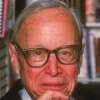Arthur M. Schlesinger, Jr.

Arthur M. Schlesinger, Jr.
Arthur Meier Schlesinger Jr.was an American historian, social critic, and public intellectual. The son of the influential historian Arthur M. Schlesinger Sr. and a specialist in American history, much of Schlesinger's work explored the history of 20th-century American liberalism. In particular, his work focused on leaders such as Harry S. Truman, Franklin D. Roosevelt, John F. Kennedy, and Robert F. Kennedy. In the 1952 and 1956 presidential campaigns, he was a primary speechwriter and adviser to the Democratic presidential nominee...
NationalityAmerican
ProfessionHistorian
Date of Birth15 October 1917
CountryUnited States of America
To say that there is a case for heroes is not to say that there is a case for hero worship. The surrender of decision, the unquestioning submission to leadership, the prostration of the average man before the Great Man -- these are the diseases of heroism, and they are fatal to human dignity. History amply shows that it is possible to have heroes without turning them into gods. And history shows, too, that when a society, in flight from hero worship, decides to do without great men at all, it gets into troubles of its own.
We are not going to achieve a new world order without paying for it in blood as well as in words and money.
The great religious ages were notable for their indifference to human rights... not only for acquiescence in poverty, inequality, exploitation and oppression, but also for enthusiastic justifications for slavery, persecution, abandonment of small children, torture, and genocide... Moreover, religion enshrined hierarchy, authority, and inequality... It was the age of equality that brought about the disappearance of such religious appurtenances as the auto-da-fe and burning at the stake.
The military struggle may frankly be regarded for what it actually was, namely a war for independence, an armed attempt to imposethe views of the revolutionists upon the British government and large sections of the colonial population at whatever cost to freedom of opinion or the sanctity of life and property.
Every President reconstructs the Presidency to meet his own psychological needs.
The only President who clearly died of overwork was Polk, and that was a long time ago. Hoover, who worked intensely and humorlessly as President, lived for more than thirty years after the White House; Truman, who worked intensely and gaily, lived for twenty
Anti-intellectualism has long been the anti-Semitism of the businessman.
I trust that a graduate student some day will write a doctoral essay on the influence of the Munich analogy on the subsequent history of the twentieth century. Perhaps in the end he will conclude that the multitude of errors committed in the name of Munich may exceed the original error of 1938.
The very discovery of the New world was the by-product of a dietary quest.
Man generally is entangled in insoluble problems; history is consequently a tragedy in which we are all involved, whose keynote is anxiety and frustration, not progress and fulfilment.
People who claw their way to the top are not likely to find very much wrong with the system that enabled them to rise.
Troubles impending always seem worse than troubles surmounted, but this does not prove that they really are.
Righteousness is easy in retrospect.
The genius of impeachment lay in the fact that it could punish the man without punishing the office.